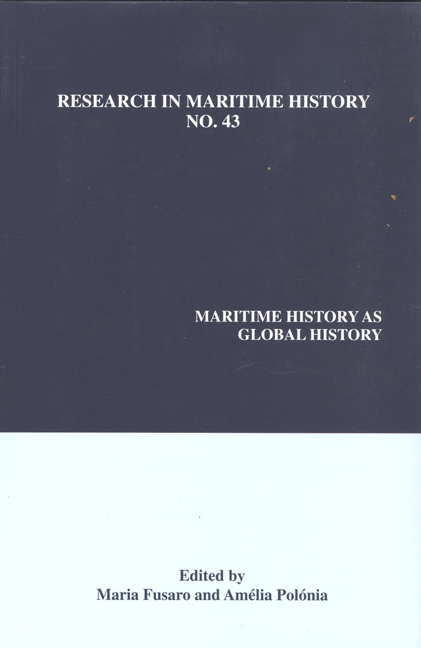Book contents
- Frontmatter
- Contents
- About the Editors
- Contributors' Notes
- “Maritime History: A Gateway to Global History?”
- “Behind the Atlantic Expansion: Flemish Trade Connections of Seville in 1620”
- “National and International Labour Markets for Sailors in European, Atlantic and Asian Waters, 1600-1850”
- “Maritime Expansion and (De)globalization? An Examination of the Land and Sea Trade in Seventeenth-Century Mughal India”
- “From Hold to Foredeck: Slave Professions in the Maritime World of the East India Company, c. 1660-1720”
- “Small Town Merchants, Global Ventures: The Maritime Trade of the New Julfan Armenians in the Seventeenth and Eighteenth Centuries”
- “Lighting up the World? Empires and Islanders in the Pacific Whaling Industry, 1790-1860”
- “Technological Advances in the Maritime Sector: Some Implications for Trade, Modernization and the Process of Globalization in the Nineteenth Century”
- “Lost in Calculation? Norwegian Merchant Shipping in Asia, 1870-1914”
- “Why Are the Major Oil Companies Selling Off their Fleets? The Case of Total”
- “Turning Maritime History into Global History: Some Conclusions from the Impact of Globalization in Early Modern Spain”
- “Maritime History as Global History? The Methodological Challenges and a Future Research Agenda”
“National and International Labour Markets for Sailors in European, Atlantic and Asian Waters, 1600-1850”
- Frontmatter
- Contents
- About the Editors
- Contributors' Notes
- “Maritime History: A Gateway to Global History?”
- “Behind the Atlantic Expansion: Flemish Trade Connections of Seville in 1620”
- “National and International Labour Markets for Sailors in European, Atlantic and Asian Waters, 1600-1850”
- “Maritime Expansion and (De)globalization? An Examination of the Land and Sea Trade in Seventeenth-Century Mughal India”
- “From Hold to Foredeck: Slave Professions in the Maritime World of the East India Company, c. 1660-1720”
- “Small Town Merchants, Global Ventures: The Maritime Trade of the New Julfan Armenians in the Seventeenth and Eighteenth Centuries”
- “Lighting up the World? Empires and Islanders in the Pacific Whaling Industry, 1790-1860”
- “Technological Advances in the Maritime Sector: Some Implications for Trade, Modernization and the Process of Globalization in the Nineteenth Century”
- “Lost in Calculation? Norwegian Merchant Shipping in Asia, 1870-1914”
- “Why Are the Major Oil Companies Selling Off their Fleets? The Case of Total”
- “Turning Maritime History into Global History: Some Conclusions from the Impact of Globalization in Early Modern Spain”
- “Maritime History as Global History? The Methodological Challenges and a Future Research Agenda”
Summary
The Armenian merchants Babtisto Basilion and Wandy Metree were not the luckiest of men. Residing in Manila when Spain declared war on England in 1780, they were expelled by the Spanish governor because they hailed from Madras and therefore were suspected of “attachment to the English.” Despite the monsoon, which made it impossible to sail for Madras, the merchants were forced to leave Manila immediately. With few options left, they purchased a small sloop and recruited a Portuguese pilot and a mixed Macau, Chinese and Indian crew. Together with an expelled French padre, the polyglot company set sail for Macau, sent on their way with only a Spanish flag and a pass approving their journey. Before they reached Macau, however, Santa Reta was sighted by Captain John Fasker of the British vessel Hornby and seized as a prize of war. The merchants filed a complaint against the seizure of their ship, and the case went to the High Court of Admiralty for further judgement. We owe the story of their Odyssey to the documentation collected in the court file.
The case of Santa Reta points to a number of aspects of early modern maritime labour markets. Crews were not necessarily recruited from one nationality, nor were they of the same nationality as the owners of the ship or the captain, as was the case in this example. Early modern sailing involved the mobilization of large numbers of workers, both for the merchant marine and – especially during wars – for the navy. The great demand for sailors, in particular in maritime centres, necessitated recruitment from a wide catchment area. Moreover, crews continually had to be refreshed while under way, not only because of the deaths but also because part of the crew often chose to jump ship. This recruitment in “foreign” ports could involve the enrolment of large numbers of men. For these reasons maritime labour markets tended to be neither local nor regional but rather national, international or even intercontinental. In this essay we try to assess how crews were composed in different maritime theatres and try to explain the patterns found.
To accomplish this we employ the so-called “Prize Papers.“ In times of war, merchant vessels belonging to enemies were regarded as lawful prizes, taken and sold for profit by naval ships or privateers.
- Type
- Chapter
- Information
- Maritime History as Global History , pp. 47 - 72Publisher: Liverpool University PressPrint publication year: 2010



